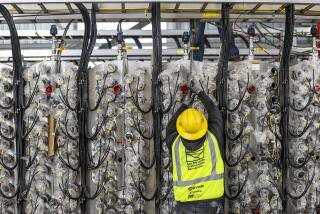Council Votes to Insist That Businesses Tie Into Sewers
- Share via
The Los Angeles City Council, moving to curb further chemical pollution of water wells in East San Fernando Valley, Wednesday approved an ordinance to require an estimated 3,000 businesses in the Valley to abandon private waste-disposal systems and hook up to city sewers.
In the same 11-0 vote, the council also approved a companion measure authorizing city officials to deny building permits to new commercial or industrial structures on Valley lots not served by sewers.
Councilman Howard Finn, whose East Valley district includes some of the businesses that will have to hook up, said the ordinances send “a message that no one’s going to stand for pollution anymore.”
DWP Recommendations
The measures are based on recommendations from a 2-year-old study by the Department of Water and Power of industrial solvent pollution of city water wells in North Hollywood and of wells operated by other water utilities in Burbank, Glendale and La Crescenta.
The report concluded that septic systems could contribute to the unacceptable levels of solvents found in more than 40% of the wells in the East Valley and outlying areas.
In North Hollywood, dozens of businesses near some of the most polluted wells are believed to be using ground disposal systems, even though sewer lines run by their properties.
The problem has caused the DWP, which draws about 15% of the city’s drinking water supply from wells beneath the East Valley, to stop using the most polluted wells and to blend water from others with clean supplies to dilute contaminant levels. Other utilities have had to take similar steps.
The mandatory sewer hookup will affect commercial and industrial firms and apartment buildings with five units or more. Smaller residential properties will not be affected.
Needs Bradley Signature
The measures must be signed by Mayor Tom Bradley before becoming law. Victoria Pipkin, assistant news secretary for Bradley, said the mayor “will have no comment until he’s had a chance to look at” the ordinances.
But Councilwoman Joy Picus, who represents part of the Valley, said she does not “think there’s much question” that Bradley will sign the ordinances, which were drafted by city officials. “If there were a problem, we would have known about it,” she said.
One city official said most affected businesses will probably have to spend $2,000 to $10,000 to comply. Bob Van Ark, an engineer with the Department of Public Works’ Bureau of Engineering, said the estimate includes the costs of properly filling in the private sewage system; extending pipes from the factory or shop to the city sewer and paying the city a sewer facilities charge, which will vary greatly according to size and use of buildings.
No Opposition, Official Says
Van Ark and other city officials said they have encountered no resistance from business groups. “It’s almost surprising,” Van Ark said. “We’re not receiving any opposition.”
Affected businesses will have a year to tie into the sewer once they receive a hookup notice from the city Bureau of Sanitation. Some businesses could have a breathing space of three years or more because the ordinance calls for phasing in the program by issuing notices first to businesses in the most critical areas.
Robert Alpern, principal sanitary engineer with the bureau, said notices will be sent first to “those kinds of industrial firms that would be most likely to produce the ground-water pollution.” He said he could not predict how long it will be before all those covered by the ordinance are issued notices.
Plan for New Sewer Mains
City officials also plan to provide sewer connections for a separate group of about 700 Valley businesses that do not now have access to sewer lines. Over the next six years, according to plans, about 11 miles of new sewer mains will be extended to the properties at a cost of more than $3.7 million. The businesses will be ordered to tie in once the sewers are available.
According to rough estimates, these businesses will be assessed about $3,500 apiece, on the average, to pay for the sewer extensions. Van Ark said they might have to spend another $3,500 or so to fill in their septic system, connect to the new sewer and pay the facilities charge.
More to Read
Sign up for Essential California
The most important California stories and recommendations in your inbox every morning.
You may occasionally receive promotional content from the Los Angeles Times.













